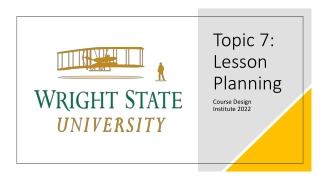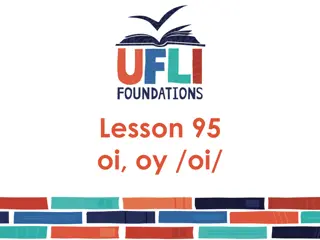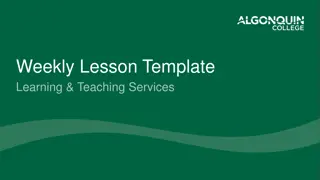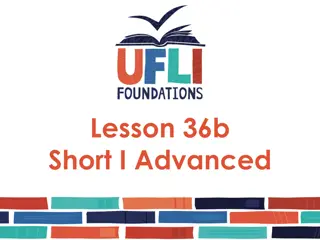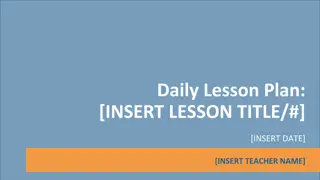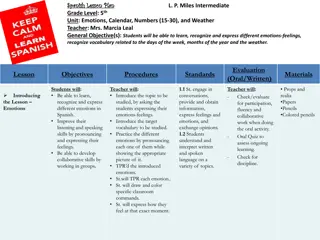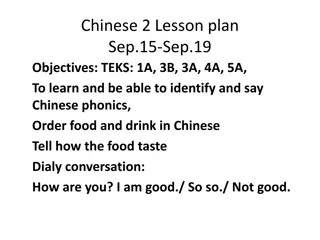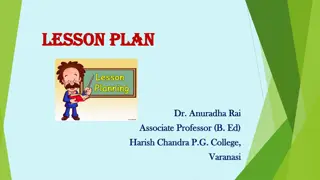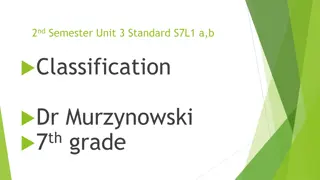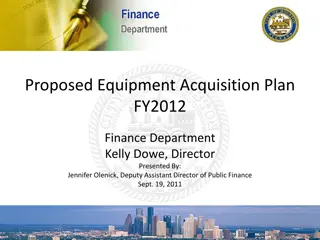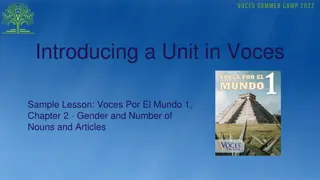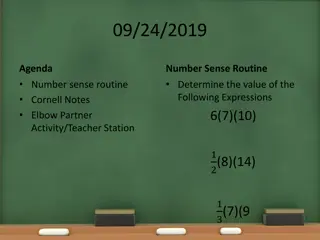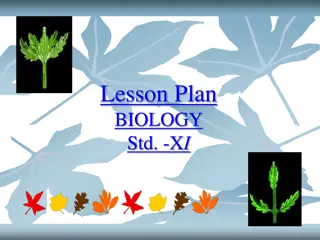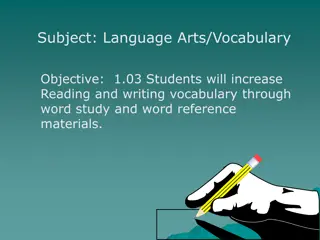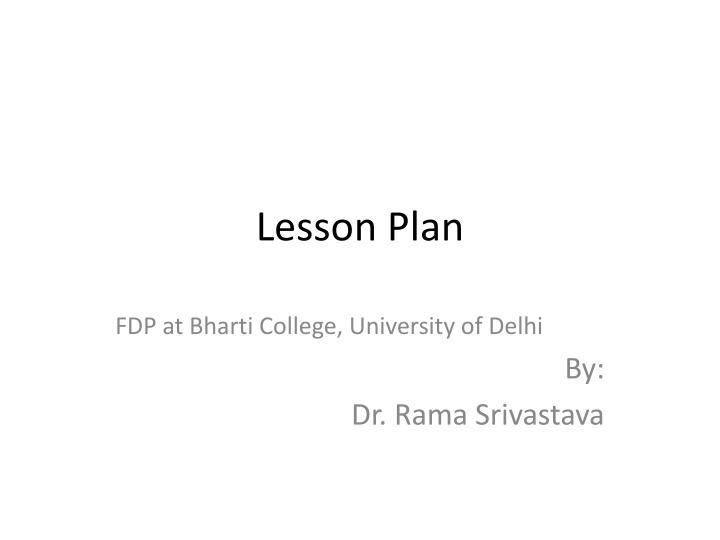
Creating Effective Lesson Plans for Successful Teaching and Learning
"Learn to develop comprehensive lesson plans to enhance student learning outcomes by focusing on objectives, activities, and assessment strategies."
Download Presentation

Please find below an Image/Link to download the presentation.
The content on the website is provided AS IS for your information and personal use only. It may not be sold, licensed, or shared on other websites without obtaining consent from the author. If you encounter any issues during the download, it is possible that the publisher has removed the file from their server.
You are allowed to download the files provided on this website for personal or commercial use, subject to the condition that they are used lawfully. All files are the property of their respective owners.
The content on the website is provided AS IS for your information and personal use only. It may not be sold, licensed, or shared on other websites without obtaining consent from the author.
E N D
Presentation Transcript
Lesson Plan FDP at Bharti College, University of Delhi By: Dr. Rama Srivastava
A lesson plan is the teachers road map of what students need to learn and how it will be done effectively during the class time. A successful lesson plan addresses and integrates these three key components Objectives for student learning Teaching/learning activities Strategies to check student understanding
What teaching and learning activities will I use What do I want Students to learn How will I check for their understanding
Pre requisites of a lesson Plan 1. Syllabus 2. Academic calendar of the University 3. List of holidays of the college 4. List of activities planned during the semester 5. Total no of teaching days available.
Steps for Preparing a Lesson Plan 1. Outline learning objectives 2. Develop the introduction 3.Plan the specific learning activities (the main body of the lesson) 4. Develop a conclusion and a preview. 5. Plan to check for understanding
Once you outline the learning objectives for the class, rank them in terms of their importance. What are the most important concepts, ideas, or skills I want students to be able to grasp and apply? Why are they important? If ran out of time, which ones could not be omitted? And conversely, which ones could be skipped if pressed for time?
6. Create a realistic timeline When you prepare your lesson plan, next to each activity indicate how much time you expect it will take Plan a few minutes at the end of class to answer any remaining questions and to sum up key points Be flexible be ready to adjust your lesson plan to students needs
Templet of a lesson plan Lesson Plan Constitutional Government and Democracy in India Course Programme: BA( Pol Science. Hons) Semester: I Academic Year: 2016 Date of commencement of classes: 4thJanuary2016 No of hours allotted to complete the syllabi*: ------------- Programme Objectives: Course Objective: : This course acquaints students with the constitutional design of state structures and institutions, and their actual working over time. The Indian Constitution accommodates conflicting impulses (of liberty and justice, territorial decentralization and a strong union, for instance) within itself. The course traces the embodiment of some of these conflicts in constitutional provisions, and shows how these have played out in political practice. It further encourages a study of state institutions in their mutual interaction, and in interaction with the larger extra-constitutional environment Course Outcomes: -------------------------
As per NBA PO1 PO2 PO3 PO4 Global perspective Course Outcomes Core/advance subject knowledge problem solving/ Critical thinking Value based Education CO1 High Moderate High Low CO2 High High High Low CO3 High High High Moderate CO4 High High High High
Reference /Readings Lecture No. UNIT Topic/ Details Planned Date Date of deliverance UNIT -I , 16 lectures The Constituent Assembly and the Constitution L 1-3 I, (a) Philoso phy of the Constit ution ER1, AR1 4,6 & 8Jan 2016 L 4-5 I , (a) The ER1, 2, AR, 2 11, 13 Jan 2016 Pream ble
Reference /Readings Lecture No. UNIT Topic/ Details Planned Date Date of deliverance UNIT -I , 16 lectures The Constituent Assembly and the Constitution L 6-8 I, (a) Featur es of the Constit ution ER2, AR1,2 15 & --- Jan 2016 ------ L9-11 I , (b) Funda ER1, 2, AR, 2 mental Rights
Reference /Readings Lecture No. UNIT Topic/ Details Planned Date Date of deliverance UNIT -I , 16 lectures The Constituent Assembly and the Constitution L 12-15 I, (a) Directi ve Principl es ER1, AR1 ------ ----------- L 16 I , (a) ER1, 2, AR1, 2 Tutorial
Reference /Readings Lecture No. UNIT Topic/ Details Planned Date Date of deliverance UNIT -II , 20 lectures Organs of Government L 17-20 II, (a) The ER1, AR1 5-13 Feb 2016 Legislat ure: Parliam ent The Executive: President and Prime Minister L 21-27 II, (b) ER1, 2, AR, 2
Reference /Readings Lecture No. UNIT Topic/ Details Planned Date Date of deliverance UNIT -I , 16 lectures The Constituent Assembly and the Constitution L 28-33 II, (c) The ER3, AR13 ------ Judiciar y: Supre me Court ----------- L 34-36 II ER1, 2& 3 AR1, 2&3 Tutorial (a,b& c)
Reference /Readings Lecture No. UNIT Topic/ Details Planned Date Date of deliverance UNIT -III , 12 lectures Federalism and Decentralization L37-39 III, (a) Divisio n of Powers ER1, AR1 ------ ----------- L 40- 42 III , ER1, 2, AR1, 2 Emerge ncy Provisi ons (a)
Reference /Readings Lecture No. UNIT Topic/ Planned Date Date of deliverance Details UNIT -II , 20 lectures Organs of Government L 43-46 III, Fifth and Sixth Schedu les ER1, AR1 ------------ (a) -------------- L 47-50 II, (b) Pancha yati Raj and Munici palities ER1, 2, AR, 2

